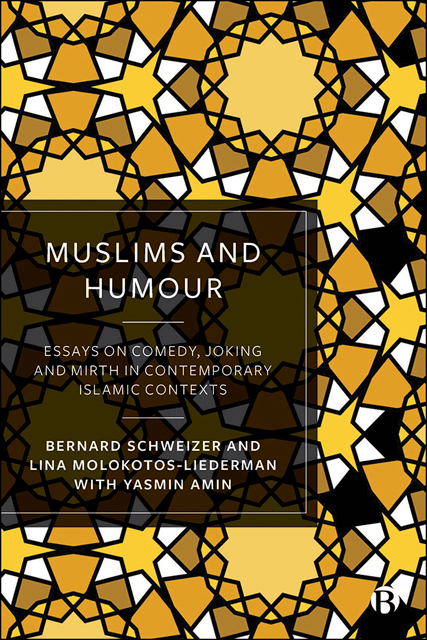Book contents
- Frontmatter
- Contents
- Notes on Contributors
- Acknowledgements
- Introduction
- Part I Theoretical Perspectives on Islam and Humour
- Part II Muslim Humour Practices in Islamicate Societies: Textual Media
- Part III Muslim Humour Practices in Islamicate Societies: Visual Media and Performance
- Part IV Muslim Comedy in North America
- Conclusion
- Bibliography on Islam and Humour
- Index
9 - ‘Putting the Fun Back into Fundamentalism’: Toying with Islam and Extremism in Comedy
Published online by Cambridge University Press: 13 October 2022
- Frontmatter
- Contents
- Notes on Contributors
- Acknowledgements
- Introduction
- Part I Theoretical Perspectives on Islam and Humour
- Part II Muslim Humour Practices in Islamicate Societies: Textual Media
- Part III Muslim Humour Practices in Islamicate Societies: Visual Media and Performance
- Part IV Muslim Comedy in North America
- Conclusion
- Bibliography on Islam and Humour
- Index
Summary
Introduction
Comedians who poke fun at self-styled ‘Islamic fundamentalists’ often invoke the truism that ‘if we don't ridicule religious zealots, then the terrorists have won’. Joking about Islam and extremism can come in many shapes and forms. The controversial Danish Muḥammad Cartoons and Charlie Hebdo's satirical drawings are among the most notorious examples, not least due to the strong and violent reactions they spurred. These controversies also led to discussions on the boundaries of freedom of speech in satire (Godioli, 2020). Nevertheless, there is a much wider spectrum of comedic engagements with the theme of Islam and extremism. For instance, we witnessed an upsurge in comedy on the topic after 9/11, which has paved the way for much of the English-language comedy about Islam and extremism that we see today. While post-9/11 comedies typically poked fun at al-Qaeda (and sometimes Bin Laden), today ISIS is a common target of ridicule within this genre. Such parodies quite literally ‘put the fun back into fundamentalism’ to borrow a joke from the renowned and talented British-Iranian comedian Omid Djalili.
While Western and English-language parodies of ISIS are often hailed for being daring and innovative, the truth is that comedians in the Middle East have also produced a plethora of ISIS parodies in Arabic. Typically, members of ISIS are portrayed as sex-crazed, dim, rigid, hypocrites who lack a profound understanding of Islam. On YouTube, one can find Palestinian, Syrian, Iraqi, and Egyptian sketches that poke fun at ISIS in Arabic (Trofimov, n.d.; Al Arabiya, 2014; Kamin, 2014; Daily Dot, 2015, 2021; Freij, 2015; Saul, 2015; Al-Rawi, 2016). The Arab region is the hardest hit by the violence of ISIS fighters, thus making ISIS a highly legitimate target of ridicule. Political comedy is often considered a tool for ‘speaking truth to power’ (Al-Rawi 2016, Alkheder, this volume). Anti-ISIS skits are steeped in dark humour and thus serve as both comic relief and political critique.
- Type
- Chapter
- Information
- Muslims and HumourEssays on Comedy, Joking, and Mirth in Contemporary Islamic Contexts, pp. 201 - 222Publisher: Bristol University PressPrint publication year: 2022

